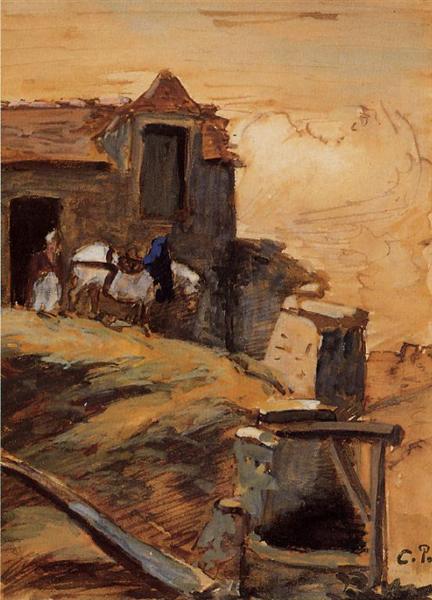Description
Camille Pissarro's painting "White Horse on a Farm" (1874) is a fascinating example of the artist's approach to landscape and rural life, a recurring theme in his work. Pissarro, considered one of the fathers of Impressionism, achieved in this work a balance between the representation of nature and everyday life, fusing meticulous observation and an emotional approach.
The work shows a pastoral landscape in which a majestic white horse stands as the focal point. This animal, with its shining coat, is situated in a rural setting full of nuance and life. The composition is carefully structured, with the horse in the foreground, capturing the viewer's attention, while the background is made up of a farm and trees that frame the scene. The horizontal lines of the farm reinforce the stability of the place, while the vertical lines of the trees provide a sense of depth and naturalness.
The colours employed by Pissarro are particularly notable. The artist uses a palette of soft, earthy tones that evoke the serenity and harmony of the rural environment. Greens, browns and blues intertwine in the landscape, creating a vibrant effect that breathes life. The use of light is another vital feature; Pissarro captures the luminosity of the day, which caresses the horse's coat and the leaves of the trees, creating a play of light and shadow that adds an almost tactile dimension to the work.
As for characters, although there are no prominent human figures, the presence of the horse suggests a connection with agricultural work and farm life. The animal, a symbol of strength and industriousness, represents both rural life and the essential role that animals play in the agrarian economy of the time. This choice of a white horse can be interpreted as a symbol of purity and tranquility, while highlighting the natural beauty that Pissarro admired and strove to depict.
Camille Pissarro, throughout his career, showed a deep interest in everyday subjects and the environment that surrounds them. "White Horse on a Farm" is not just a representation of a rural scene, but a reflection on the connection between man, nature and country life. This work can be seen as a precursor to modernity in art, where the focus on the everyday begins to be celebrated.
The technique of Impressionism, which Pissarro played a pivotal role in popularizing, is evident in this work. It not only seeks to capture the appearance of reality, but at the same time implies a personal interpretation of the landscape. The loose brushwork and vibrant colors are indicative of the style driven by light and atmosphere, key elements that the Impressionists explored to convey the transience of everyday moments.
"White Horse on a Farm" is set in a broader artistic context where rural life was valued in contrast to the increasing urbanization of the late 19th century. In this work, Pissarro not only pays homage to the beauty of the countryside, but also invites the viewer to contemplate the importance of preserving these spaces and the traditions that surround them.
Ultimately, this painting stands as a testament to Pissarro's ability to capture not just the image, but the essence of what it means to live in harmony with nature. Through his gaze and technical mastery, the artist offers us a unique and peaceful perspective of rural life, highlighting its importance within the narrative of 19th-century art.
KUADROS ©, a famous painting on your wall.
Hand-made oil painting reproductions, with the quality of professional artists and the distinctive seal of KUADROS ©.
Painting reproduction service with satisfaction guarantee. If you are not completely satisfied with the replica of your painting, we will refund 100% of your money.

